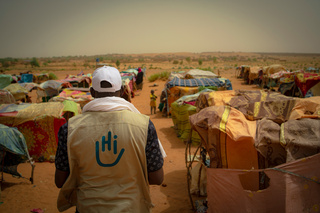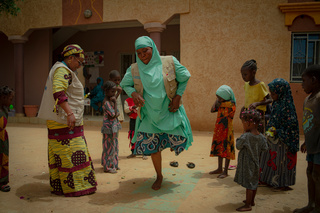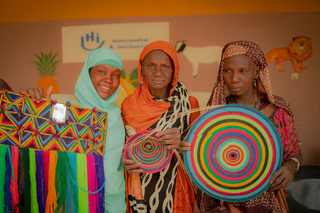The deteriorating security situation in the Gao region of eastern Mali is characterised by forced population movements, kidnappings, robberies, rapes and murders. The growing presence of parties involved in the conflict is also leading to the closure of schools and government services. Forced to flee their homes, people are taking refuge in large towns such as Gao, which in December 2023 was home to more than 36,000 displaced people. Far from being safe, these populations still experience physical and psychological abuse. To help protect them and relieve their distress, and thanks to funding from the European Union, Humanity & Inclusion (HI) deployed psychosocial support and mental health services between April 2023 and April 2024, promoting a community-based approach to enable the development of sustainable and resilient practices.
Protecting the populations and relieving their distress
 Since 2012, the Gao region has been experiencing a multidimensional crisis. An upsurge in violence between the parties to the conflict is forcing thousands of people to flee their homes in an attempt to escape the attacks. These people, mostly women and children, are finding refuge around the town of Gao. They are living in very precarious conditions in tents on the edge of the desert, nurturing the hope of one day being able to return home.
Since 2012, the Gao region has been experiencing a multidimensional crisis. An upsurge in violence between the parties to the conflict is forcing thousands of people to flee their homes in an attempt to escape the attacks. These people, mostly women and children, are finding refuge around the town of Gao. They are living in very precarious conditions in tents on the edge of the desert, nurturing the hope of one day being able to return home.
Many of them experienced traumatic events that triggered their displacement. They are suffering from disorders that affect their health and well-being. Moreover, the precarious situation in which they are living puts them at risk of further violence and limits their access to care and basic services.
HI’s project offers these communities protection services, including mental health and psychosocial support. Our mobile teams, comprised of psychologists and psychosocial workers, visit the communities to assess and respond to their needs. Long-term personalised support is then offered to those most in difficulty. Between April 2023 and April 2024, HI supported more than 5,200 people.
Games for the children
"We use games, such as football or hopscotch, and music to help us detect cases of distress in children. We try to spot children who are isolating themselves or showing signs of anxiety," explains Mohamed Cheikh Hamala Keita, HI’s psychologist and manager of a listening and play centre.
 HI has also set up two safe listening and play spaces in the town of Gao. These are community facilities run by psychosocial workers and psychologists, with the support of community relays. A range of recreational activities are organised to give women and girls the chance to meet up, restore social links and allow children to have fun and unwind.
HI has also set up two safe listening and play spaces in the town of Gao. These are community facilities run by psychosocial workers and psychologists, with the support of community relays. A range of recreational activities are organised to give women and girls the chance to meet up, restore social links and allow children to have fun and unwind.
"Our main role is to help, support, listen, guide and provide care for the people who come to see us. At the centre, there are lots of games for the children and we organise group activities. Playing allows the children to release stress and overcome the traumatic situations they have experienced," explains Aminatou Moussa Touré, psychosocial worker.
A special focus on women
The project places a special focus on women and girls, organising creative activities designed to encourage expression and self-fulfilment and to develop mutual help and support. These shared moments are also an opportunity to inform them about their rights, gender equality issues, sexual and reproductive health, and so on. Legal and financial support is also offered to survivors of sexual violence.
"We organise knitting, sewing and cooking activities. These activities are essential because they encourage women to come to the centre, where we can talk to them, discuss our daily lives and concerns," says Aminatou Moussa Touré.
 To strengthen skills and resilience, HI has trained and is now working with around twenty community relays. Every week, these women and men organise awareness-raising sessions on topics such as human rights, sexual violence and access to services. In all, 227 awareness-raising sessions have been organised, reaching more than 15,000 displaced people and people from host communities. The support of community leaders, volunteers and five community organisations ensures that these actions are successfully implemented.
To strengthen skills and resilience, HI has trained and is now working with around twenty community relays. Every week, these women and men organise awareness-raising sessions on topics such as human rights, sexual violence and access to services. In all, 227 awareness-raising sessions have been organised, reaching more than 15,000 displaced people and people from host communities. The support of community leaders, volunteers and five community organisations ensures that these actions are successfully implemented.
"Before, we didn't do this kind of activity. With the support of HI, we are now able to raise awareness so that everyone can learn about these different concepts and know their rights. I also organise training courses for men and women with disabilities who haven't had the chance to go to school, to teach them how to read and write," says Mohamed N'Daye, president of the regional association of people with disabilities.
Finally, HI has distributed dignity kits to more than 370 people, each containing, among other things, sanitary towels, ointment, toothpaste, a toothbrush, hard soap and washing powder.
This protection, mental health and psychosocial support project is being implemented with the support of the European Union. Through the Directorate-General for European Civil Protection and Humanitarian Aid Operations (ECHO), the European Union helps millions of victims of conflicts and disasters every year.


 Since 2012, the Gao region has been experiencing a multidimensional crisis. An upsurge in violence between the parties to the conflict is forcing thousands of people to flee their homes in an attempt to escape the attacks. These people, mostly women and children, are finding refuge around the town of Gao. They are living in very precarious conditions in tents on the edge of the desert, nurturing the hope of one day being able to return home.
Since 2012, the Gao region has been experiencing a multidimensional crisis. An upsurge in violence between the parties to the conflict is forcing thousands of people to flee their homes in an attempt to escape the attacks. These people, mostly women and children, are finding refuge around the town of Gao. They are living in very precarious conditions in tents on the edge of the desert, nurturing the hope of one day being able to return home. HI has also set up two safe listening and play spaces in the town of Gao. These are community facilities run by psychosocial workers and psychologists, with the support of community relays. A range of recreational activities are organised to give women and girls the chance to meet up, restore social links and allow children to have fun and unwind.
HI has also set up two safe listening and play spaces in the town of Gao. These are community facilities run by psychosocial workers and psychologists, with the support of community relays. A range of recreational activities are organised to give women and girls the chance to meet up, restore social links and allow children to have fun and unwind. To strengthen skills and resilience, HI has trained and is now working with around twenty community relays. Every week, these women and men organise awareness-raising sessions on topics such as human rights, sexual violence and access to services. In all, 227 awareness-raising sessions have been organised, reaching more than 15,000 displaced people and people from host communities. The support of community leaders, volunteers and five community organisations ensures that these actions are successfully implemented.
To strengthen skills and resilience, HI has trained and is now working with around twenty community relays. Every week, these women and men organise awareness-raising sessions on topics such as human rights, sexual violence and access to services. In all, 227 awareness-raising sessions have been organised, reaching more than 15,000 displaced people and people from host communities. The support of community leaders, volunteers and five community organisations ensures that these actions are successfully implemented.


